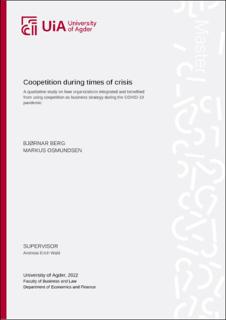| dc.description.abstract | The aim of this study was to examine how organizations integrate and use coopetition as
strategy during times of crisis and how it potentially differs from normal circumstances.
Despite much research in the topic of coopetition there was a lack of previous research
literature that examines how coopetition is affected during market crises. Our inspiration for
our thesis initially came from an article by Crick and Crick (2020) which suggested that due
to the lack of sound research on the topic of coopetition during times of crisis, businesses
might get into such relationships without enough knowledge, which can possibly lead to grave
consequences.
In conducting the research, we chose to utilize a qualitative approach to better understand the
intricacies and complexity of coopetition. To collect the data, we did semi-structured
interviews with managers about their organization’s strategy and experience with coopetitive
relationships. The data sample ended up being five interview objects in different industries.
The data was then systematically categorized in themes by antecedents and consequences,
systematically analyzed and then compared to earlier study findings of coopetition explored in
the literature review.
The main findings in this master thesis suggest that some antecedents and consequences
played a key role in coopetitive relationships during the COVID-19 pandemic. Notably did
flexibility as consequence from coopetition make the organizations better suited to withstand
and quickly adapt to the impact of the volatile market circumstances during the pandemic.
This flexibility was achieved primarily by sharing workforce and reducing costs in
collaboration with competitors. In regard to antecedents of coopetition, our study shows that
multiple key drivers of coopetition were present during the pandemic, suggesting that the
crisis generated new coopetition agreements in the business market. Multiple of the
interviewed organizations in the study reported about positive experience from using
coopetition as strategy during the COVID-19 pandemic.
The small sample size of in the study harms the generalizability of the study, but we still
believe that the observations and conclusions in our thesis is a contribution to the narrow field
of coopetition during crisis and could be a good starting point for future research on the topic. | |
